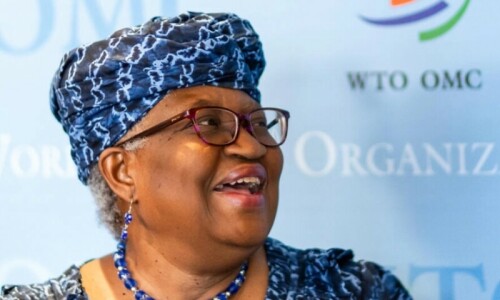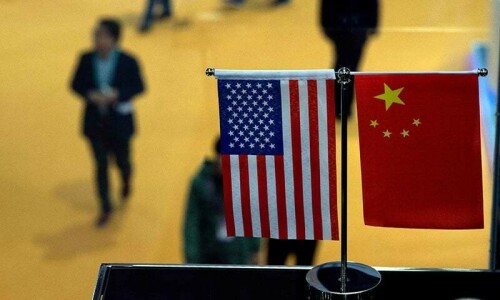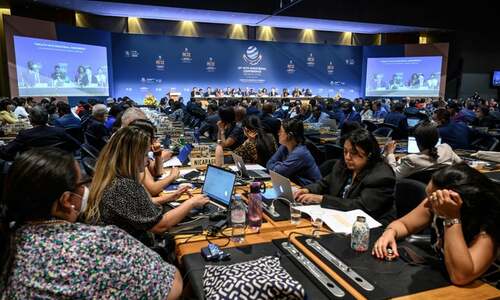Trade ministers from around the world gathered in Abu Dhabi on Monday for a World Trade Organisation (WTO) meeting that aims to set new global commerce rules, but its ambitious chief Ngozi Okonjo-Iweala and delegates sought to curb expectations.
The almost 30-year-old global watchdog, whose rules underpin 75 per cent of global commerce, tries to strike deals by consensus, but such efforts are becoming more difficult amid signs that the global economy is fragmenting into separate blocs.
“Let’s not pretend that any of this will be easy,” Okonjo-Iweala said in her opening speech, describing the atmosphere as “tougher” than the WTO’s last 2022 meeting, citing wars, tensions and elections and signs that trade growth will undershoot the organisation’s own estimate.
She called on ministers to “roll up their sleeves” and complete negotiations, but seemed to rule out any deal in Abu Dhabi on reforming the body’s mothballed appeals court.
“We are not there yet,” she said.
Thani Al Zeyoudi, conference chair and UAE’s foreign trade minister said in an opening address: “The multilateral trading system with the WTO at its core is at a critical juncture; it is confronting many challenges.
“The WTO remains a powerful force in countering the current unilateralism, protectionism, and discrimination.”
Some delegates privately voiced concerns that India’s trade minister, seen as the main holdout on some key issues including agriculture, was absent on Monday although New Delhi said he would be in Abu Dhabi on Tuesday.
New members
Negotiators say they remain hopeful for an agreement that could buoy global fish stocks and protect fishermen by banning government subsidies.
Other outcomes from the four-day meeting that are either definite or achievable are the accession of two new members — Comoros and East Timor — and a deal among around 120 countries to remove development-hampering investment barriers.
Tougher areas are extending a 25-year moratorium on applying tariffs on digital trade, which South Africa and India oppose, and an agreement on agriculture trade rules that has eluded negotiators for decades.
Indian Commerce Minister Piyush Goyal repeated on Monday New Delhi’s drive for a controversial stand-alone permanent waiver to WTO rules that currently restrict domestic agriculture subsidies on food items like rice.
“I think this week is really about trying to consolidate progress from two years ago and build on where possible, but I don’t think there’s going to be major new breakthroughs in new areas,” said Simon Conveney, Ireland’s Minister for Enterprise, Trade and Employment, referring to the WTO’s 2022 meeting in Geneva.
US Trade Representative Katherine Tai said the meeting was a chance to “chart a future path together” and that success should not be measured by the number of deals.
One factor that could help is the determination of Okonjo-Iweala, a former Nigerian finance minister, whose insistence on all-night meetings helped deliver a package of deals in Geneva in 2022. She has already asked ministers to plan for the four-day talks to run overtime.
The European Trade Commissioner Valdis Dombrovskis said that uncertainty and multiple crises were impacting the rules-based global order.
“This tense geopolitical environment makes multilateral organizations like the WTO much more, not less, important,” he said.














































Dear visitor, the comments section is undergoing an overhaul and will return soon.